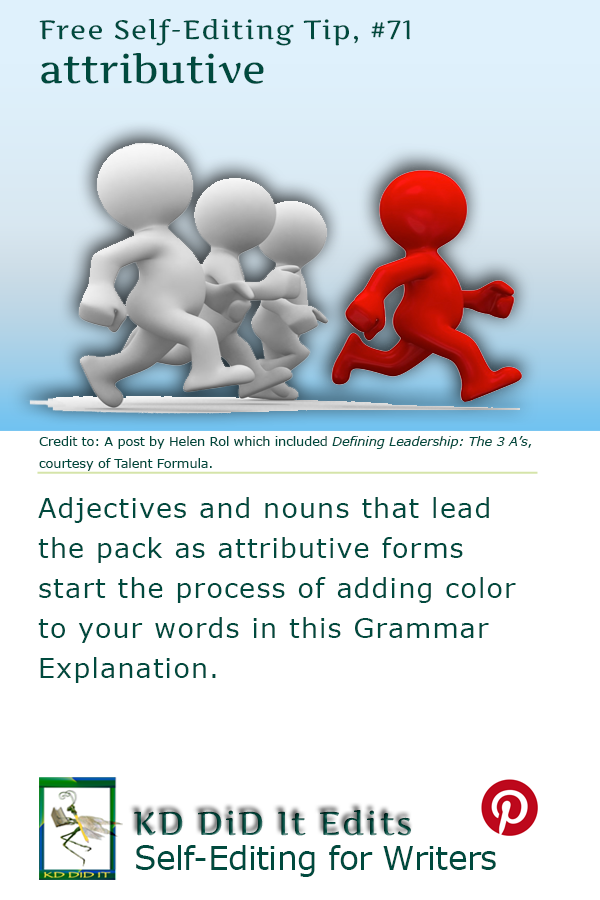Revised as of
28 Jan 2023
The attributive is actually inclined to the subject position, the first part of a sentence where the noun usually appears.
It simply means that words used in the subject position are considered attributive, a word that mostly appears as an abbreviation, attrib., in the dictionary to indicate that this sense of the word is used in front of the subject noun to modify the noun.
One example that brought it home for me was the noun, bread, combined with the noun, roll. As bread roll, “bread” is the attributive noun that modifies the head noun, “roll”.
Grammar Explanations is . . .
. . . an evolving list of the structural rules and principles that determines where words are placed in phrases or sentences as well as how the language is spoken. Sometimes I run across an example that helps explain better or another “also known as”. Heck, there’s always a better way to explain it, so if it makes quicker and/or better sense, I would appreciate suggestions and comments from anyone on an area of grammar with which you struggle or on which you can contribute more understanding.
If you found this post on “Attributive” interesting, consider subscribing to KD Did It, if you’d like to track this post for future updates.
| Attributive | ||||||||||
| Part of Speech: Modifier | ||||||||||
| General Definition: Designates the position in a sentence taken by an adjective or noun that comes before a head noun. It is joined directly to a modified adjective or noun. The opposite of predicative.
Dictionary Term: Dictionaries frequently include an abbreviated “note”, [ attrib. ], in definitions to indicate a modification of the term being defined and use of the label is limited to those nouns quite frequently used in this manner. |
||||||||||
| Attributive Types: | ||||||||||
| Attributive Adjective | Rule: The adjective comes before the noun. It may also modify (and sit inside) a noun phrase) it modifies.
Many adjectives can be used in either the attributive or predicative position. The post, “Adjective”, may have additional information to read on attributive adjectives and attributive adjective phrases. |
|||||||||
|
Return to top or post contents |
Examples: | |||||||||
|
Legend:
|
||||||||||
| Attributive-Only Adjective | Rule: Some adjectives can only be used in an attributive position — in front of the noun — and include:
|
|||||||||
|
Return to top or post contents |
List of Attributive-Only Adjectives | |||||||||
|---|---|---|---|---|---|---|---|---|---|---|
Credit to: Kosur |
||||||||||
| Intensifying Attributive Adjective | Definition: Enhances and gives additional emotional context to the word it modifies. | |||||||||
|
Return to top or post contents |
|
|||||||||
| Restrictive Attributive Adjective | Definition: Limits or restricts the context of the word it modifies.
A.k.a., limiter attributive adjective, limiting attributive adjective |
|||||||||
|
Return to top or post contents |
|
|||||||||
| Attributive Noun | Definition: A noun that functions as a modifier for another noun, usually performing as an adjective. | |||||||||
|
Return to top or post contents |
It may act as a compound noun or noun phrase, in which case it is usually hyphenated, which allows a reader encountering the words in sequence to understand them immediately as a modifier. If a compound attributive noun is written without a hyphen, then a reader is likely to misinterpret it initially as a subject or predicate.
A.k.a., noun premodifier Rule: The noun does not use a linking verb to describe it. |
|||||||||
| Examples: | ||||||||||
|
Legend:
|
||||||||||
| Rule: Attributive nouns rarely move back and forth between the attributive and predicative positions. | ||||||||||
| Examples: | ||||||||||
|
||||||||||
C’mon, get it out of your system, bitch, whine, moan . . . which words are your pet peeves? Also, please note that I try to be as accurate as I can, but mistakes happen or I miss something. Email me if you find errors, so I can fix them . . . and we’ll all benefit!
Satisfy your curiosity about other Grammar Explanations by exploring its homepage or more generally explore the index of self-editing posts. You may also want to explore Book Layout & Formatting Ideas, Formatting Tips, Grammar Explanations, Linguistics, Publishing Tips, the Properly Punctuated, Word Confusions, Writing Ideas and Resources, and Working Your Website.
Resources for Attributive
Some of these links may be affiliate links, and I will earn a small percentage, if you should buy it. It does not affect the price you pay.
Apple Dictionary
Chalker, Sylvia and Edmund Weiner. The Oxford Dictionary of English Grammar. Oxford University Press. 1994. Print.
Dictionary.com: attributive
Kosur, Heather Marie. “Predicative-Only Adjectives.” Linguistics Girl. 2013. Web. n.d. <http://www.linguisticsgirl.com/predicative-only-adjectives/#WGyPlDCSOcpr3xFx.99>.
Merriam-Webster: attributive
Pinterest Photo Credits
A post by Helen Rol which included Defining Leadership: The 3 A’s, <http://talentformula.ca/development/leadership>, courtesy of Talent Formula, <http://talentformula.ca/>.


